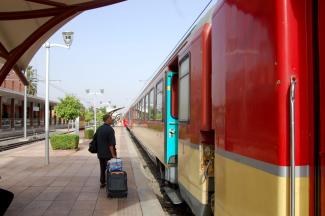Sustainable mobility
Fundamental transformation required
 fm
fm
If rural areas’ transport infrastructure were better developed, 1 billion more people could get access to education, health care and jobs. Globally, improved traffic safety could prevent 800,000 road deaths per year. These are two important messages of a report that was recently published by Sustainable Mobility for All (SuM4All), an umbrella organisation of public and private actors.
The authors point out that transport urgently needs to become less dependent on fossil fuels. They consider industrialised countries to be responsible in particular because their transport-related greenhouse-gas emissions per capita are the highest.
According to the report, reducing carbon emissions would not only serve climate protection, but also help to reduce air pollution and the associated health risks. These problems are most severe in South Asia.
Many international agreements specifically address sustainability in the transport sector. Examples include the UN Sustainable Development Goals (SDGs) and the Paris Climate Agreement. As the report bemoans, however, implementation remains poor. In some countries, road construction has been promoted to improve access to markets and jobs, but side effects include more deaths as well as more air and noise pollution.
The report draws attention to the trend of isolated technologies – such as electric vehicles, for example – being over-promoted. The obvious idea is to cut greenhouse-gas emissions, but that will only happen if the electric power used is generated by renewable means, which often is not the case. Moreover, the authors warn that it is not healthy to reduce the diversity in the means of transport. While appreciating the progress made in some areas, the SuM4All report insists that the need for a fundamental, systemic transformation is not being met.
The report proposes a list of the most relevant policies for making transport systems sustainable. It offers no blueprint, because each country must take action according to its specific situation. However, SuM4All presents various instruments in four toolboxes:
- Regulatory and institutional instruments include rules on safety, vehicle use, emissions, transport services, cross-border traffic and data management.
- The technology toolbox covers the planning, provision and maintenance of transport infrastructure and services. In this context, the coordination of different means of transport is particularly important and deserves attention at every stage. Safety regulations must be observed as well.
- The economic and financial toolbox includes concerning taxation, subsidies, loans, pricing et cetera. Close coordination of the public sector, which bears responsibility for infrastructure, with profit-driven companies is essential. Private individuals and companies use the system, and the latter provide innovative technologies, products, services and business models.
- The communication toolbox helps to run awareness raising geared to changing behaviour, identifying transport alternatives and managing knowledge.
The report includes an additional web tool for checking out country-specific mobility indices. Such data should inform policymaking. Various indices, such as the number of passengers per rapid train routes, for example, help to assess the quality of existing transport infrastructure. Overall, the report shows that action in this sector can contribute strongly to the global transition to sustainability.
Link
Sustainable mobility for all, 2019: Global roadmap of action toward sustainable mobility.
http://www.sum4all.org/gra
Floreana Miesen is a geographer and freelance author.
floreana.miesen@gmx.de

